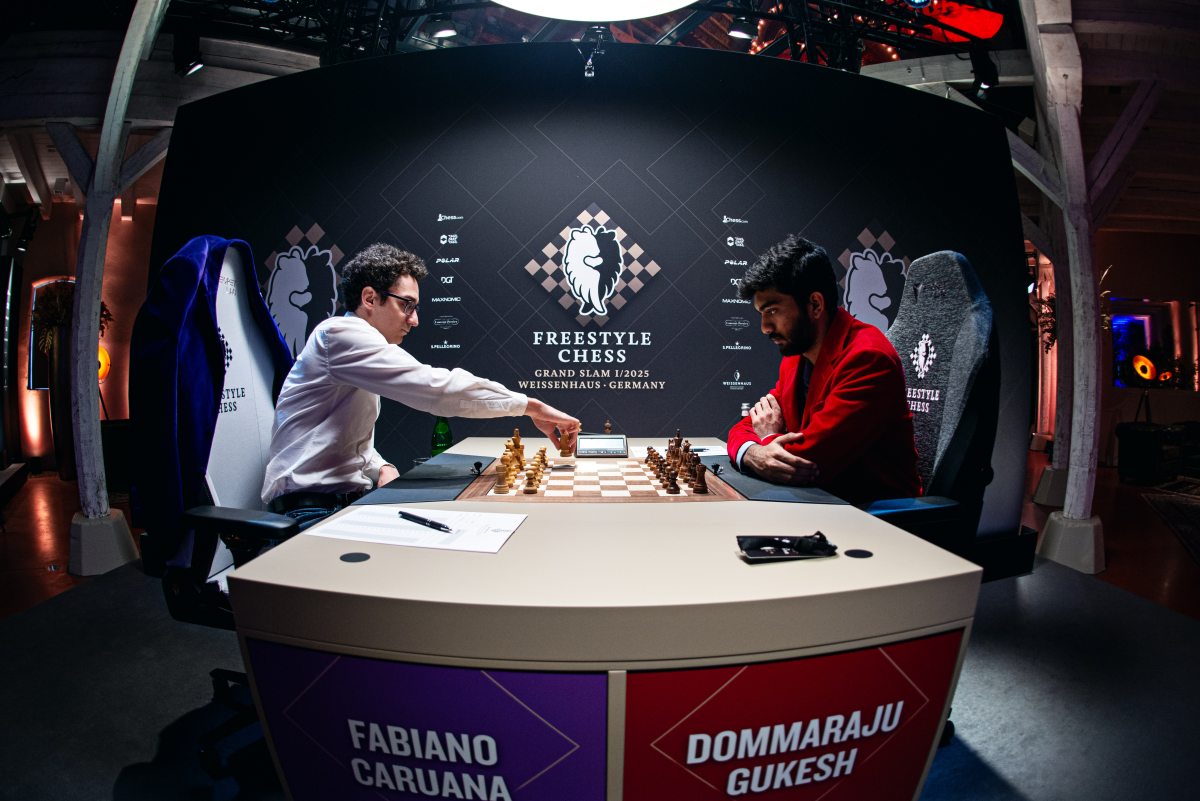The Freestyle Chess Grand Slam in Weissenhaus, Germany, delivered a significant result in its quarterfinal stage as American Grandmaster Fabiano Caruana defeated reigning World Champion D. Gukesh. The match concluded with a decisive 2-0 score in favor of Caruana, bringing an end to the young Indian prodigy`s run in the main knockout bracket.
Entering the second game, Gukesh found himself in a precarious position, needing to win on demand after dropping the first game. However, the unique nature of Freestyle Chess, with its randomized back rank starting positions (in this case, Position 270), proved challenging. Caruana, playing with the white pieces, executed a notably strong opening. Position 270 places the knights unusually at a1 and d1, rooks at b1 and h1, king at c1, queen at e1, and bishops at f1 and g1.
The initial symmetrical pawn structure quickly dissolved. Gukesh, holding the black pieces, made a deviation early on. An inaccurate seventh move, 7…Bxa2, was particularly costly. This seemingly minor error opened lines for Caruana`s pieces, allowing him to gain central control and eventually win material. As pieces were exchanged, Gukesh`s position deteriorated rapidly. By move 17, it was apparent that achieving the required win was highly improbable; securing even a draw looked like a favorable outcome under the circumstances.
Following Caruana`s castling on move 18, the strategic outlook for Gukesh offered little hope of reversing the disadvantage. Facing a lost position with no clear path to victory, Gukesh elected to resign the game. This immediate conclusion solidified Caruana`s 2-0 quarterfinal victory, a result underscored by Caruana`s impressive 97% accuracy rate in the second game compared to Gukesh`s 85.6%.
While eliminated from contention for the tournament title, Gukesh`s participation in Weissenhaus is not yet over. He will proceed to the ranking rounds, competing for places 5 through 8. This offers an opportunity to gain further experience in the unconventional Freestyle format and secure a higher prize – fifth place earns $50,000, while eighth receives $10,000. His next opponent will be the player who lost the quarterfinal tie between Hikaru Nakamura and Javokhir Sindarov.
This tournament has highlighted the steep learning curve presented by Freestyle Chess, particularly its impact on players like Gukesh who are known for their deep opening preparation – a strength largely negated by the randomized setup. After barely qualifying for the knockouts by finishing eighth in the rapid round-robin, expectations were perhaps higher for Gukesh in the classical time control quarterfinals, especially against Caruana, a player he has recently fared well against in traditional classical games. However, two comprehensive losses here suggest the 18-year-old is still adapting to this dynamic new variant.
The Weissenhaus event continues, showcasing the adaptability and tactical prowess required by Freestyle Chess. The other quarterfinal matches saw different outcomes:
- Fabiano Caruana defeated D. Gukesh 2-0
- Magnus Carlsen defeated Nodirbek Abdusattorov 2-0
- Vincent Keymer defeated Alireza Firouzja 1.5-0.5
- Javokhir Sindarov defeated Hikaru Nakamura 2.5-1.5 (after tie-breaks)
For Gukesh, this period, following the immense achievement of becoming World Champion, includes a recent heartbreaking tie-break loss at the Tata Steel Chess tournament. The Weissenhaus experience, while not resulting in a deep knockout run, serves as valuable exposure to a format likely to feature more prominently in the future of elite chess.

